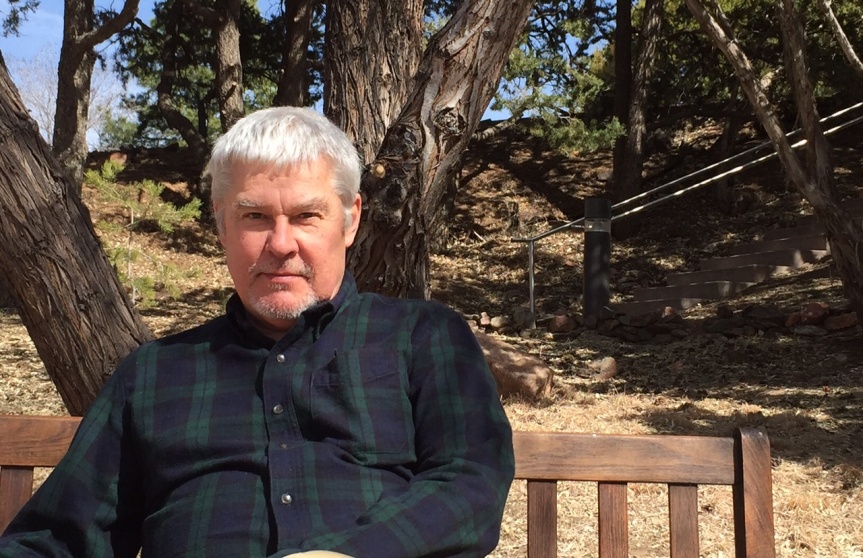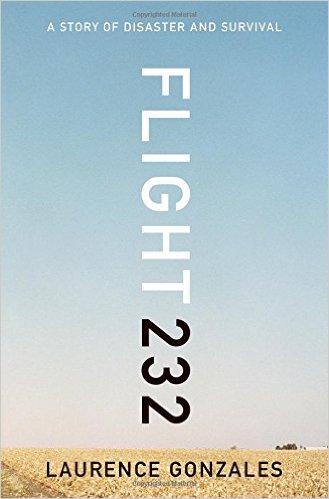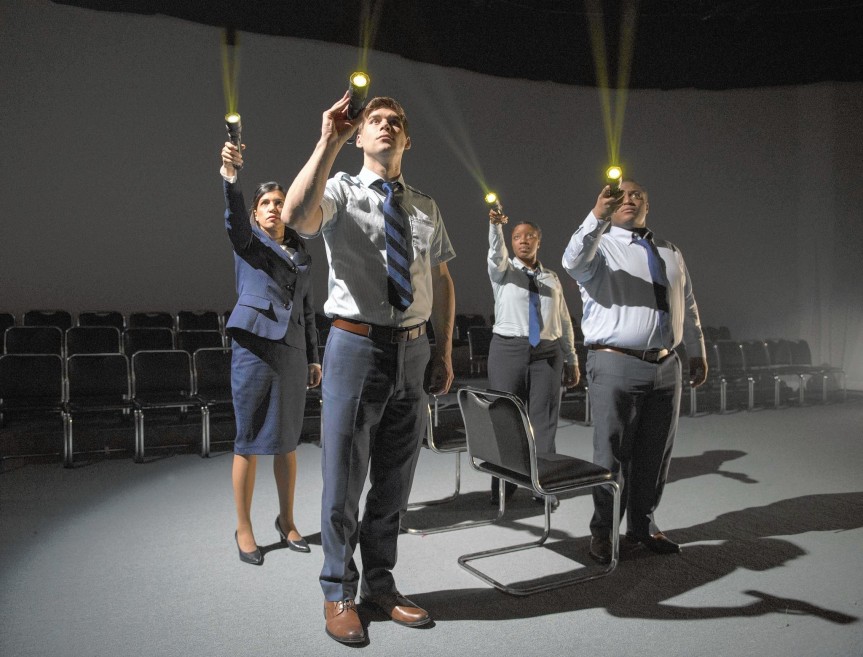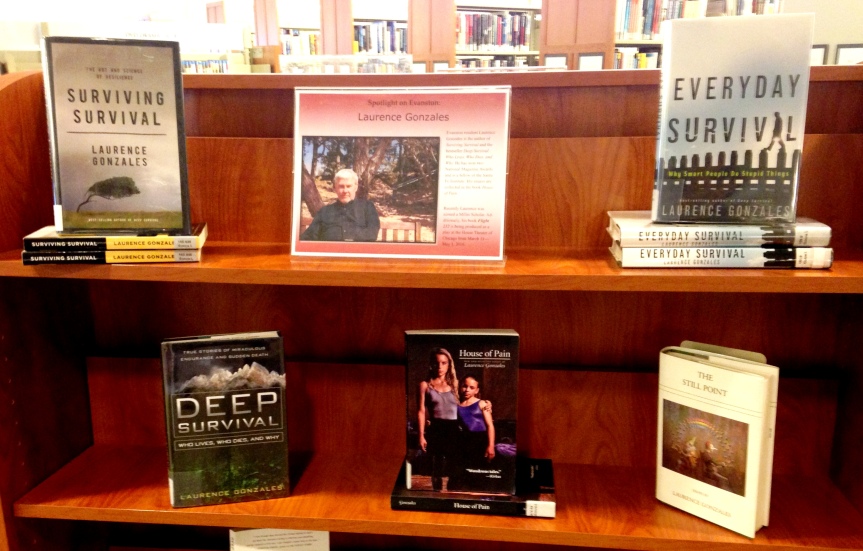
Laurence Gonzales’s impressive list of literary achievements just got even longer. Already the winner of two prestigious National Magazine Awards and the Distinguished Service Award from the Society of Professional Journalists, the bestselling Evanston author recently had the honor of seeing his acclaimed book Flight 232: A Story of Disaster and Survival adapted for the Chicago stage. Titled “United Flight 232,” the House Theatre of Chicago production opened to rave reviews on March 11 and runs through May 1 at the Chopin Theatre. But that’s not all. On March 21, Gonzales was also named a Miller Scholar of the Santa Fe Institute (SFI) – an award previously received by author Neal Stephenson and actor-playwright Sam Shepard and given annually to “highly accomplished, creative thinkers who make profound contributions to our understandings of society, science, and culture.” In celebration of all his good news, we recently spoke with Gonzales via email about the origins of Flight 232 and its journey to the stage, his plans for his twelve months at SFI, and his appreciation of the poet James Wright.
Evanston Public Library: Your incredible book Flight 232: A Story of Disaster and Survival tells the true story of the fiery 1989 Iowa plane crash that 184 passengers miraculously survived and serves as the inspiration for the new House Theatre of Chicago production “United Flight 232.” Before we talk about the play, can you discuss what motivated you to write the book? What initially drew you to the story of Flight 232?
Laurence Gonzales: It was simply the most heart-wrenching, dramatic material I had ever encountered, with unprecedented highs and lows, as people struggled with the inevitability of catastrophe and tried to survive and to help others to survive. Once I encountered the material, it was irresistible. I could not NOT tell this story of human transcendence.
 EPL: Could you give us a sense of the research that was required to write Flight 232? What role did libraries play in the process, and did you uncover any surprises?
EPL: Could you give us a sense of the research that was required to write Flight 232? What role did libraries play in the process, and did you uncover any surprises?
LG: A library gave birth to Flight 232. Whenever I research a project, I go to the library and stand in front of the shelves where the material I am looking for is located. And I scan the shelves for anything that strikes my interest. You cannot do this sort of search on the Internet. You have to be in a library. I was actually working on a proposal for a book on depression, looking at all the books on depression, when a title caught my eye: Chosen to Live. I picked it up and there was a photograph of the wrecked airplane on the cover. Having been a pilot and aviation researcher all my life, I wondered what it was doing with the books on depression. It turns out that the author Jerry Schemmel was on Flight 232 and suffered PTSD and depression after the crash. I read his story and included a chapter on him in my proposal for a book on depression. My agent read it and said, “Thank you very much for this proposal on depression, but what’s the air crash stuff? I was up all night. It was riveting.” And of course, then the light bulb went off over my head: There are all these people out there who survived Flight 232, and their stories could be told. A book was born out of the library’s simple system of putting books together that are about the same subject.
Were there surprises? Every single day was a surprise. The material was relentlessly astounding.
EPL: Can you tell us about Flight 232’s journey to the stage? To what degree were you involved with the adaptation?
LG: The adaptation for the stage was completely the work of Vanessa Stalling and her wonderful company at the House Theatre of Chicago. I gave her all of my research, including raw interviews, and acted as a sounding board for her when she had questions. But she’s the genius behind this wonderful play. I didn’t even see it in rehearsal. I went opening night and saw it for the first time.

EPL: Tribune critic Chris Jones described the play as a “visceral” theater experience that is “deeply sad, inspiring, [and] reorienting in terms of what is important in life…” What are your impressions of the finished production, and what is your reaction to how well it’s being received? Have you had any particularly memorable encounters with the actors or audience members?
LG: It’s difficult for me to judge the work in terms of my reaction to it, because so many of the words spoken in the play come directly from my book. I lived with that material for years, and it’s very familiar to me. What is not familiar is the way in which Vanessa transformed it and made it come to life on the stage. I could not have conceived of what she and the House Theatre crew have done. Of course, I’m thrilled that the public is embracing the play. It’s been selling out, and the theater has had to add matinees and more seating. Since I didn’t know what to expect when I saw the play, one of my most memorable encounters was when I hugged Vanessa and said, “I’m so proud of you.” Everyone was in tears.
EPL: Changing gears a little, congratulations on being named a Miller Scholar of the Santa Fe Institute (SFI). How does it feel to join past Miller Scholars such as author Neal Stephenson and actor-playwright Sam Shepard in receiving this prestigious honor? How do you plan to devote your twelve months in residence?
LG: I was bowled over by the appointment. As I write to you now, I am actually at the Santa Fe Institute during their annual Science Symposium, and I spend my days talking to the smartest people in the world. Or rather listening to them talk. Tomorrow, for example, I will be visiting Murray Gell-Mann at his house. He won the Nobel Prize in physics for predicting the existence of the atomic particle called the quark. The license plate on his car says “QUARKS.” How does it feel? The Santa Fe Institute is the place where the misfits fit. It’s the place I’ve been looking for all my life. These are the Merry Pranksters of science, and I am spending my time there trying to write the Electric Kool-Aid Acid Test of SFI.

EPL: Finally, as both a nonfiction author and a novelist, can you give us a window into what you like to read? Are there certain authors who inspire you, or books you’ve particularly enjoyed recently? Do you have a favorite poem to help us celebrate National Poetry Month?
LG: Because of all the research I do, I don’t get a lot of time to read for pleasure. And if I tell you I’m reading about the role of thermodynamics in the origins of life, most people will tune out. So I’ll turn to the fun stuff. The appointment to SFI subjects me to frequent flights of three hours, and I have tried to devote those flights to books that I’ll read for fun or out of curiosity. Recent trips were taken up with Gone Girl by Gillian Flynn, The Girl on the Train by Paula Hawkins, The Price of Salt by Patricia Highsmith, A Sport and a Pastime by James Salter, Appointment in Samarra and Butterfield 8 by John O’Hara…. I could go on. But I think you get the idea.
The poem I choose for Poetry Month is surprisingly obscure and yet in my view is deserving of the highest praise. I’m not sure why it’s not more widely known or widely anthologized. It’s called “The Assignation” and it’s by James Wright. It is a profound, astounding tour de force. I believe it’s his best. When I was in school (when dinosaurs roamed the earth) it was taught as an example of the chief modern poets of England and America. I hope more people become aware of it and that it is brought back into the canon.
The Assignation
After the winter thawed away, I rose,
Remembering what you said. Below the field
Where I was dead, the crinkled leaf and blade
Summoned my body, told me I must go.
Across the road I saw some other dead
Revive their little fires, and bow the head
To someone still alive and long ago.
Low in the haze a pall of smoke arose.
Inside the moon’s hollow is a hale gray man
Who washed his hands, and waved me where to go:
Up the long hill, the mound of lunar snow,
Around three lapping pebbles, over the crossed
Arms of an owl nailed to the southern sky.
I spun three times about, I scattered high,
Over my shoulder, clouds of salt and dust.
The earth began to clear. I saw a man.
He said the sun was falling toward the trees,
The picnic nearly over. Small on the lake
The sails were luring lightning out of dark,
While quieter people guided slim canoes.
I hid in bushes, shy. Already cars
Shuttled away, the earliest evening stars
Blurred in a cloud. A lone child left his shoes
Half in the sand, and slept beneath the trees.
With fires demolished, everybody gone
To root in bushes, congregate by trees
Or haul the yellow windows down to haze,
I lost my way. Water in water fell,
The badgers nibbled rootlets up the shore,
For dancing more than food, where long before
Women had gossiped. Chanting a soft farewell,
Canaries swung. Then everything was gone.
No hurry for me there, I let my dress
Fall to the lawn, the pleasure of the silk
Wind with the subtle grass, berries and milk
of skin sweeten me. Snuggling, I lay prone,
Barren yet motherly for what might come
Out of the emptied branches, man or flame.
I shivered slightly. Everything was gone,
Everyone gone. I kicked aside my dress
O then it was you I waited for, to hold
The soft leaves of my bones between your hands
And warm them back to life, to fashion wands
Out of my shining arms. O it was you
I loved before my dying and long after,
You, you I could not find. The air fell softer,
My snatch of breath gave out, but no one blew
My name in hallowed weeds. Lonely to hold
Some hand upon me, lest it float away
And be ass dead as I, thrown in a sack
of air to drown in air, I rose, lay back
In trees, and died again. The spiders care
For trellises they hold against the sky,
Except for walls of air the houses die
and fall; and only for my flesh of air
Your flesh of earth would lean and drift away;
But you cared nothing, living, false to me.
What could I do but take a daemon then
And slouch about in dust, eager for pain
Or anything, to keep your memory clear?
A thing came down from the dark air on wings
And rummaged at my limbs, to hold my wings
Down in the dirt; I could not see for fear.
The thing withdrew, full of the dark and me.
And I was riven. Even my poor ghost
Can never stand beside your window now;
I stir the wind, I chatter at a bough,
But make no sound. Your cowardice may keep
You from your assignation with my ghost,
The love you promised me when I was dust,
Not air. And yet I cannot even sleep,
I cannot die, but I will be my ghost
Driven to find this orchard every year,
This picnic ground and wait till everyone
Tires of the sundown, turns the headlights on,
To float them off like moths into the dark.
I will stand up to strip my hunger off,
And stare, and mumble, knowing all your love
Is cut beside my name on the white rock,
While you forget the promise and the year.
You sat beside the bed, you took my hands.
And when I lay beyond all speech, you said,
You swore to love me after I was dead,
To meet me in a grove and love me still,
Love the white air, the shadow where it lay.
Dear love, I called your name in air today.
I saw the picnic vanish down the hill,
And waved the moon awake, with empty hands.
Interview by Russell J.
